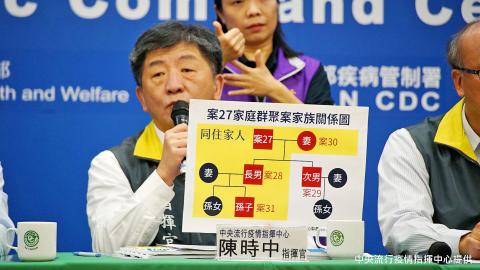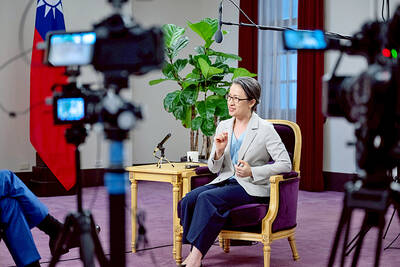The Central Epidemic Command Center (CECC) yesterday announced that a ban on medical personnel traveling abroad is to last until June 30 and that tightened access controls would be implemented at hospitals to prevent a COVID-19 outbreak at healthcare facilities.
Minister of Health and Welfare Chen Shih-chung (陳時中), who heads the center, on Sunday said that medical personnel would be banned from traveling abroad, but the CECC on Monday clarified that there are different levels to the ban, and that the details and complementary measures would be discussed in a meeting on Tuesday.
“The subject of the ban is all medical personnel, of any department and any position, working in hospitals, but those working in clinics are not included,” Ministry of Health and Welfare Department of Medical Affairs Director-General Shih Chung-liang (石崇良) told a news conference at the CECC yesterday.

Photo courtesy of the Central Epidemic Command Center
Medical personnel are strictly prohibited from visiting countries or areas where the center has issued a level 3 “warning” travel advisory for COVID-19 — China, Hong Kong, Macau and South Korea — and they must apply to and gain approval from the ministry if they need to make a visit, he said.
Medical personnel are asked to temporarily avoid travel to countries where a level 2 “alert” or a level 1 “watch” travel advisories have been issued — such as Japan, Singapore, Iran, Italy and Thailand, Shih said, adding that they would have to apply in advance and gain approval from their hospitals before leaving.
The ban went into effect on Sunday and is to last until “June 30, but it might be shortened or extended depending on the COVID-19 epidemic situation,” Shih said. “The prohibition includes layovers in any of these countries or areas.”
Medical personnel who have gained special approval to visit the affected areas must comply with quarantine rules for such areas and would not be allowed to take part in frontline healthcare work for 14 days after returning to Taiwan, he said.
People who have traveled to areas with a level 3 travel advisory in the 14 days prior to their arrival in Taiwan face a 14-day mandatory home quarantine and those arriving from areas with a level 2 or a level 1 travel notice must perform self-health management for 14 days.
Medical personnel who are affected by the travel ban can apply for full compensation for financial losses, such as from canceling flights, under the Special Act on COVID-19 Prevention, Relief and Restoration (嚴重特殊傳染性肺炎防治及紓困振興特別條例) passed on Tuesday, Shih said.
The meeting on Tuesday with hospital management also concluded that hospitals must step up access controls to prevent COVID-19 transmission, Shih said, adding that the measures are aimed at three types of visitors.
Hospitals are required to make plans to separate the flow of “patients” moving within hospitals, he said.
They should limit visiting hours and the number of visitors — each inpatient can have only two visitors at one time and only one companion, including caretakers — who must register their personal information and travel and contact history with the hospital, he added.
The ministry also set up management guidelines for dispatch workers, including janitors; waste management personnel; security guards; medical gown, bedding rental and laundry service workers; caretakers; and shop employees, Shih said.
The guidelines include requiring dispatch workers to comply with all procedures set by the hospitals; enter and exit through specially arranged routes; and wear a mask when in health facilities, while hospitals should educate outside contractors about disease-prevention measures and ask them to monitor their employees’ health conditions, he said.

China might accelerate its strategic actions toward Taiwan, the South China Sea and across the first island chain, after the US officially entered a military conflict with Iran, as Beijing would perceive Washington as incapable of fighting a two-front war, a military expert said yesterday. The US’ ongoing conflict with Iran is not merely an act of retaliation or a “delaying tactic,” but a strategic military campaign aimed at dismantling Tehran’s nuclear capabilities and reshaping the regional order in the Middle East, said National Defense University distinguished adjunct lecturer Holmes Liao (廖宏祥), former McDonnell Douglas Aerospace representative in Taiwan. If

TO BE APPEALED: The environment ministry said coal reduction goals had to be reached within two months, which was against the principle of legitimate expectation The Taipei High Administrative Court on Thursday ruled in favor of the Taichung Environmental Protection Bureau in its administrative litigation against the Ministry of Environment for the rescission of a NT$18 million fine (US$609,570) imposed by the bureau on the Taichung Power Plant in 2019 for alleged excess coal power generation. The bureau in November 2019 revised what it said was a “slip of the pen” in the text of the operating permit granted to the plant — which is run by Taiwan Power Co (Taipower) — in October 2017. The permit originally read: “reduce coal use by 40 percent from Jan.

‘SPEY’ REACTION: Beijing said its Eastern Theater Command ‘organized troops to monitor and guard the entire process’ of a Taiwan Strait transit China sent 74 warplanes toward Taiwan between late Thursday and early yesterday, 61 of which crossed the median line in the Taiwan Strait. It was not clear why so many planes were scrambled, said the Ministry of National Defense, which tabulated the flights. The aircraft were sent in two separate tranches, the ministry said. The Ministry of Foreign Affairs on Thursday “confirmed and welcomed” a transit by the British Royal Navy’s HMS Spey, a River-class offshore patrol vessel, through the Taiwan Strait a day earlier. The ship’s transit “once again [reaffirmed the Strait’s] status as international waters,” the foreign ministry said. “Such transits by

Taiwan is doing everything it can to prevent a military conflict with China, including building up asymmetric defense capabilities and fortifying public resilience, Vice President Hsiao Bi-khim (蕭美琴) said in a recent interview. “Everything we are doing is to prevent a conflict from happening, whether it is 2027 or before that or beyond that,” Hsiao told American podcaster Shawn Ryan of the Shawn Ryan Show. She was referring to a timeline cited by several US military and intelligence officials, who said Chinese President Xi Jinping (習近平) had instructed the Chinese People’s Liberation Army to be ready to take military action against Taiwan